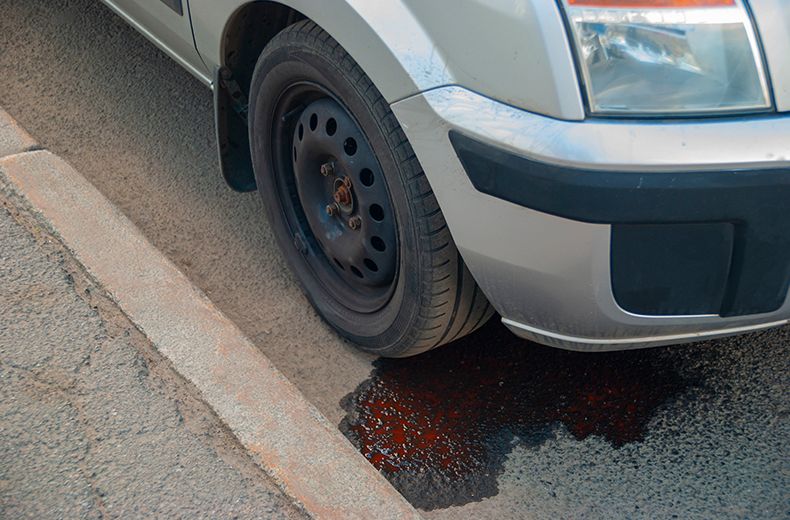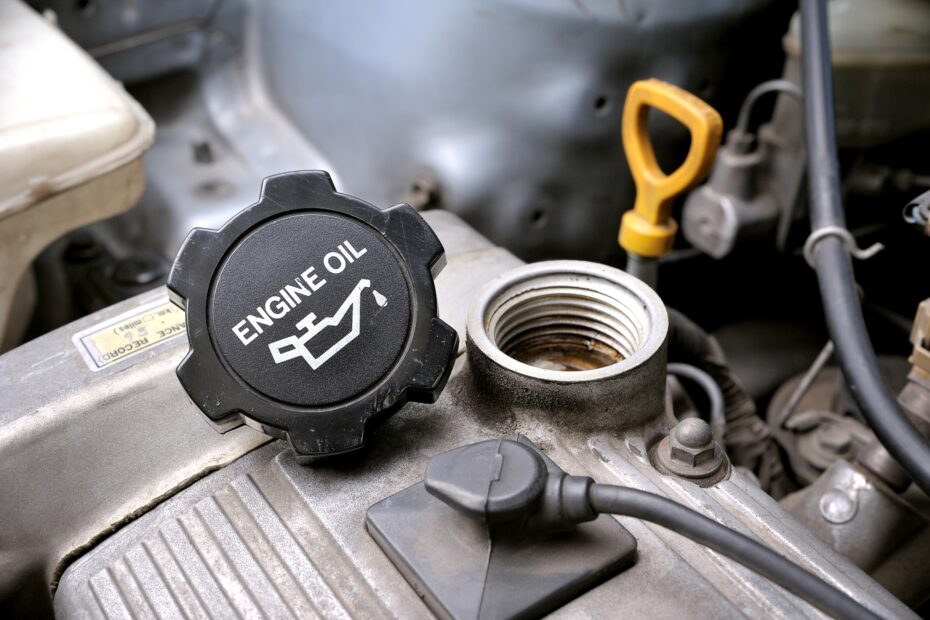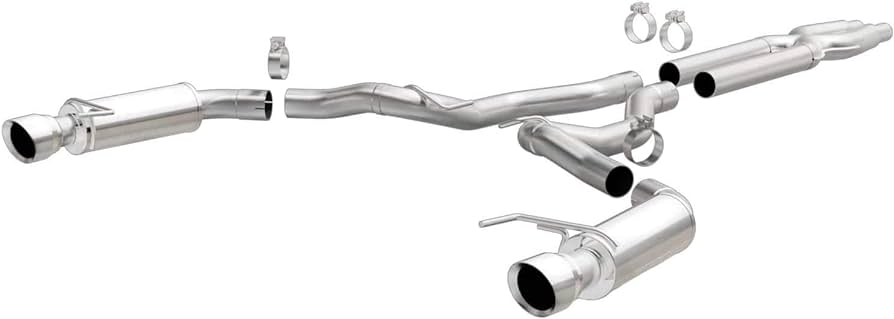To tell if you have an oil leak, check for oil spots under your car or a burning smell while driving. Look for low oil levels or a sudden drop in oil pressure.
An oil leak can lead to serious engine damage if not addressed promptly. Consequently, it’s important to regularly inspect your vehicle for any signs of a potential oil leak to avoid costly repairs and maintain the health of your engine.
Failure to detect and address an oil leak early enough can lead to severe engine damage, resulting in costly repairs. Regularly inspecting your vehicle for any signs of a potential oil leak is essential for preserving the health of your engine and avoiding unexpected breakdowns. It’s important to take prompt action if you suspect an oil leak, as neglecting this issue can have serious consequences for the performance and longevity of your vehicle.

Credit: www.youtube.com
Common Signs Of An Oil Leak
An oil leak can be a concerning issue for car owners, as it can lead to potential engine damage and costly repairs if left unaddressed. Therefore, it is crucial to be able to recognize the signs of an oil leak early on. By being aware of these common indicators, you can take prompt action to minimize any potential damage and ensure the longevity of your vehicle.
Unusual Smells
If you detect a strong, unpleasant odor resembling burnt oil or exhaust fumes while inside or near your car, it could be a strong indication of an oil leak. The smell is often caused by oil dripping onto hot engine parts or leaking onto the exhaust system. Ignoring this distinctive odor can lead to more severe engine problems in the long run, so it’s imperative to investigate the source of the smell.
Oil Puddles Under Your Car
Finding oil puddles under your car is perhaps one of the most obvious signs of an oil leak. After parking your vehicle, be sure to keep an eye out for wet spots or dark stains on the ground. These puddles might be formed by leaking oil and can vary in size depending on the severity of the leak. It is important to note that oil leaks can occur underneath the engine, transmission, or differential, so thoroughly check all areas to identify the source.
| Common Signs of an Oil Leak |
|---|
| Unusual Smells |
| Oil Puddles Under Your Car |
Considering these common signs can help you determine if your car has an oil leak. Promptly addressing an oil leak can save you from potential engine damage and expensive repairs. Remember, regular maintenance and inspection are essential for maintaining the longevity and performance of your vehicle.
- Unusual smell reminiscent of burnt oil or exhaust fumes
- Finding oil puddles underneath your vehicle
Checking For Oil Leaks
When it comes to maintaining the health of your vehicle, it’s crucial to regularly check for oil leaks. Identifying a potential oil leak early can help prevent costly damage and ensure your engine operates smoothly. Here are a few simple steps to help you determine if your car has an oil leak.
Inspecting The Oil Level
Begin by checking your vehicle’s oil level using the dipstick. Ensure the car is parked on a level surface and the engine is turned off for at least 10 minutes before assessing the oil level. Carefully remove the dipstick, wipe it clean, reinsert it, and then remove it again to observe the oil level. If the oil level is significantly lower than the recommended amount, it could indicate a potential oil leak.
Examining The Engine And Undercarriage
Next, visually inspect the engine compartment and undercarriage of your vehicle for any signs of oil. Look for noticeable puddles or spots of oil beneath the car or around the engine. Additionally, check the entire engine for any visible signs of oil leaks such as dripping oil, greasy residue, or a strong smell of burning oil. Any of these signs may indicate an oil leak that requires immediate attention.
Common Causes Of Oil Leaks
When it comes to identifying oil leaks in your vehicle, understanding the common causes can help you address the issue promptly. By recognizing the signs of an oil leak and pinpointing the source, you can prevent potential damage to your engine and maintain optimal performance.
Worn Gaskets And Seals
Worn gaskets and seals are a prevalent cause of oil leaks in vehicles. Over time, the gaskets and seals that maintain a tight seal between engine components can degrade due to heat, pressure, and general wear and tear. This can result in oil seepage and eventually lead to a noticeable leak.
Loose Or Damaged Oil Pan
A loose or damaged oil pan can also be a contributing factor to oil leaks. The oil pan, responsible for holding the engine oil, can develop cracks or be improperly fitted, leading to oil seepage. Moreover, loose or missing bolts securing the oil pan to the engine can cause oil to escape from the gasket.

Credit: www.rac.co.uk
Impact Of Ignoring An Oil Leak
Detecting an oil leak early is crucial. Ignoring it can lead to engine damage, decreased performance, and potential safety hazards. Regularly check for oil puddles under your car to prevent costly repairs and ensure vehicle longevity.
When it comes to car maintenance, ignoring an oil leak can have serious consequences. Aside from being an environmental hazard, an oil leak can lead to various issues ranging from engine damage to safety hazards. It’s crucial for car owners to be able to recognize the signs of an oil leak and understand the impact of letting it go unchecked. ### Engine Damage If you ignore an oil leak, your engine will suffer the consequences. Oil is essential for lubricating the moving parts of the engine, reducing friction, and preventing overheating. Without proper lubrication, these metal components will grind against each other, causing wear and tear. This can lead to costly repairs, such as replacing damaged bearings, camshafts, or even the entire engine. Leaving an oil leak unrepaired can also result in oil starvation, where the engine doesn’t receive enough oil to function properly. This can lead to engine seizure, a catastrophic failure that can render your vehicle inoperable. In addition to the financial burden of engine repairs or replacements, it can also leave you stranded on the side of the road, causing inconvenience and frustration. ### Safety Hazards Ignoring an oil leak doesn’t just affect the engine; it can also pose significant safety hazards. When oil drips onto the pavement, it creates a slippery surface, increasing the risk of accidents. Your vehicle may lose traction, especially during wet or rainy conditions, leading to a loss of control. Moreover, leaking oil can contaminate other critical components, such as the brakes. Since oil reduces friction, its presence can interfere with the brake system’s ability to function properly. This can lead to longer stopping distances, reduced braking effectiveness, or even complete brake failure, putting you and others at risk on the road. ### Conclusion Recognizing the impact of ignoring an oil leak is crucial for car owners. Engine damage can result in costly repairs or even render your vehicle inoperable. Safety hazards, including slippery roads and compromised brake systems, increase the risk of accidents. Knowing the signs of an oil leak and addressing it promptly can save you from potential headaches, expenses, and ensure the safety of yourself and others on the road.Steps To Address An Oil Leak
Discovering an oil leak in your vehicle can lead to serious issues if not promptly addressed. Follow these steps to tackle an oil leak to avoid further damage.
Seek Professional Help
If you are unsure about the severity of the leak, seek professional assistance immediately.
Regular Maintenance Practices
- Check your oil levels regularly to identify potential leaks early.
- Inspect under your vehicle for any signs of oil puddles or drips.
- Keep up with scheduled oil changes to prevent leaks caused by old or dirty oil.

Credit: www.capitol-chevy.com
Frequently Asked Questions For How To Tell If You Have An Oil Leak
How Do You Know If Oil Is Leaking?
To determine if oil is leaking, look for oil spots or puddles under the vehicle. Check for a strong oil smell and oily residue on the engine, radiator, or hoses. Monitor the oil level regularly and if it consistently decreases, it could indicate a leak.
Can You Drive A Car With An Oil Leak?
Yes, you can drive a car with an oil leak, but it’s not recommended. It can lead to engine damage, safety risks, and environmental harm. Get the leak fixed promptly and monitor oil levels for safe driving.
Are Oil Leaks Expensive To Fix?
Yes, oil leaks can be expensive to fix depending on the extent of the damage and the type of repair needed. It is important to address oil leaks promptly to prevent further damage and costly repairs. Regular maintenance can help identify and address oil leaks early.
What 3 Things Can Cause An Oil Leak?
The three main causes of an oil leak are worn-out gaskets, loose or damaged oil drain plugs, and cracks in the oil pan. These issues can lead to oil seeping or dripping from the engine, potentially causing damage if left unaddressed.
How Can I Check For Oil Leaks At Home?
If you notice oil spots under your car, inspect the engine, transmission, and hoses for leaks.
What Are Common Signs Of An Oil Leak?
Look out for low oil levels, burning smell, oil puddles, and engine overheating as potential signs.
How Serious Is An Oil Leak In A Car?
Ignoring oil leaks can lead to engine damage, decreased performance, and potentially costly repairs.
Conclusion
Recognizing the signs of an oil leak in your vehicle can save you from potential engine damage and costly repairs. By keeping an eye out for oil puddles, strong burning smells, or an unusually low oil level, you can take prompt action to address the issue.
Remember, regular maintenance and inspections are key to ensuring the longevity and performance of your car. Stay vigilant and address any potential oil leaks promptly to keep your vehicle running smoothly.
- How to Diagnose Bad Strut Mounts: Expert Tips for Quick Fixes - May 16, 2024
- How to Bypass Blower Motor Relay: 7 Expert Techniques - May 16, 2024
- How to Easily Check Ecu Ground: Essential Steps for Optimal Performance - May 16, 2024



